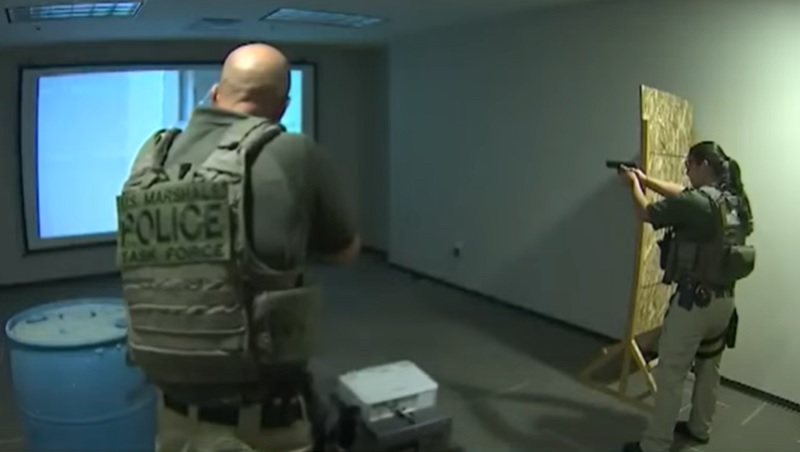
By Steve Pomper
Decision-making defines a cop’s job. There are routine decisions like what equipment to carry on your duty belt, what area to focus on during patrol, or whether to make that minor traffic stop.
That can increase to which route to take when a call comes out of an officer in a vehicle or foot pursuit, or for a “help the officer.”
And then there are the use of force decisions, including lethal. These decisions are made so fast it often seems like it’s done “without thinking.” But if you’ve taught yourself to think critically under normal circumstances, you’re likely to make better choices when there’s little or no time.
I’m interested in four categories: critical thinking, decision-making, distraction, and hesitation.
Critical Thinking
You’d think the law enforcement profession would want employees who just follow orders. But officers must also make life-or-death decisions in split seconds. Routinely thinking critically enhances an officer’s ability to make good decisions during crises.
Inspector Michelle Ridlehoover, of the Washington D.C. Metro PD, in an article for FBI.com, wrote, “The law enforcement training culture must shift away from debate over whether to act as a warrior or a guardian. Instead, it must continuously emphasize critical thinking throughout the career of every law enforcement officer—whether they must act in any given moment as a guardian or as a warrior.”
There’s been a lot of talk about some schools not teaching students critical thinking. We don’t want limited-thinking robots who have trouble making independent, critical decisions. Inspector Ridlehoover also said this lack of focus on critical thinking can include law enforcement.
Critical thinking can also be learned from watching how experienced officers handle calls. This helps the decision-making process when rookie officers end up the only cop at a scene. He or she is the one with direct information. If it’s a life-or-death moment, sometimes from behind gun sights, that cop is the sole decision-maker.
Inspector Ridelhoover said, “Critical thinking is an integral part of law enforcement decision-making. All departments should weave it into their cultures, from the academy to the field.”
Decision Making
The Toolshero website says, “[d]ecision making refers to making choices between alternative options for action.” They also note that making no decision “is also an alternative course of action.”
Going a bit deeper, there’s also the Recognition Primed Decision Making (RPD). RPD “is a model about the process of decision making when people need to make quick and effective decisions in complex situations.”
Concepts like RPD can seem somewhat cumbersome at a glance. Great stuff, but some will fear is “too much to recall, especially in an emergency.”
But learning such concepts is not a memorization and regurgitation thing. This is about storing the information in your head so you will naturally incorporate it into your critical decisions during an emergency.
For example, let’s say you have to draw your firearm. You don’t think about basic steps as an instructor taught you: firm grasp on handgun grip, press the release button or snap, draw firearm, trigger finger indexed, focus on the front sight, squeeze, don’t jerk the trigger, etc.
According to Dennis Tueller (Tueller Drill, 21-foot-rule), at seven yards, the average officer can draw and fire in 1.5 – 2 seconds. Not much time to review class notes.
Distraction
This is not about a suspect distracting you. It’s about being distracted by things you hear about on the news. For example, what cop-hating district attorneys like George Gascon in L.A. and Larry Krasner in Philly are up to. Discipline, firing, and prosecuting officers for doing their jobs in good faith, is a huge distraction for officers.
Some officers are distracted by the abundant social and legacy media truth vs. myth reporting. With the anti-police, myth-making industrial complex (BLM/Antifa), myth too often wins over truth.
Hesitation
This distraction that hangs over officers can cause them to hesitate when action is necessary to preserve life. This involves the fear of what unknowns await an officer who acts in a way cop-haters decide is “wrong.”
Don’t forget the recent coverage, including at NPA, of officers who were prosecuted for doing their jobs as trained. Lt. John Mitchell stopped a mobile active shooter but, since 2019, a prosecutor has had him languishing in a callous suspended animation awaiting a final decision on trial or dismissal.
And there’s former 26-year veteran Brooklyn Center, Minnesota police officer Kim Potter who was convicted of a crime for making a tragic but honest mistake. She inadvertently drew her firearm instead of her Taser and shot the driver who was resisting arrest and trying to drive away with another officer hanging half in and out of the suspect’s car. Despite this, she was sent to prison.
Don’t think for a moment cops don’t have these examples, and many more, creeping through their minds as they patrol their beats.
Over a decade ago, a very competent officer I knew, former military combat vet, came into the precinct after a call looking a bit—well, distracted. He told me he froze up when a “homeless” man suddenly ran at his patrol car, screaming at him, while slamming his fists down on the hood.
His combat instincts and police skills were intact, so he knew how to react. But, very uncharacteristically, he said he hesitated. He wasn’t sure what to do. He told me the anti-cop media reporting had distracted him. It compromised his decision-making abilities.
He said thinking about cops who splashed on the news, were getting disciplined, fired, and sometimes even prosecuted made him overthink his response. He said prosecuting an officer, not for making a bad decision, but for doing his job correctly, scared the hell out of him.
Policymakers need to reflect on the damage that occurs to public safety when politics hijack the police disciplinary process. Policing is all about good decision making. And if society wants officers to make good decisions, policymakers need to make good decisions.